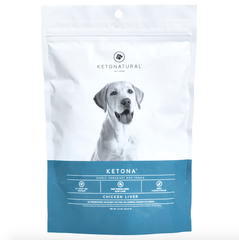Save Money, Save Your Dog.
Join Our Email List For Discounted Pricing and a Free Guide to the Science of Keto Dog Food.
The next time you're walking down the dog food aisle at your local pet store, I invite you to look for products that claim to help your dog live longer. You may be surprised by what you find.
Pet food is one of the most notoriously under-regulated industries in the United States. Even so, this is the United States. And it's the 21st Century. Surely we're not allowing businesses to sell products that promise a longer lifespan without some pretty solid evidence to back up the claim.
Right?
RIGHT?!?!
While the majority of U.S. pet food regulation is controlled by an privately-funded industry group called the Association of American Feed Control Officials (AAFCO), the United States Food and Drug Administration also plays an important oversight role in specific instances.
One of those instances is marketing and labeling tied to diseases. In most cases, the FDA flatly prohibits pet food brands from making claims concerning matters of disease treatment or prevention. Which is sensible. You shouldn't be able to say your dog treats cure, say, Covid-19 unless you've cleared some pretty tall evidentiary hurdles.
The FDA's regulatory framework does this by outlawing all disease claims in non-drug products. If you want to claim that your pet food cures a disease, then in the FDA's eyes you are selling a drug. And in order to sell anything classified as a drug in the United States you'll first need to go through an intensive and time-consuming pre-approval process.
Unfortunately, if you think about it for a minute, you'll notice that the rule against disease claims has an implied workaround that's so large that it practically swallows the rule: just because you can't say your product cures diseased body functioning doesn't mean you can't say that it helps maintain normal (i.e., non-diseased) functioning. Preventing disease is a no-no, maintaining a lack of disease is just fine.
See the difference? Perhaps an example will help.
Unless you're willing to go through the FDA's intensive pre-approval process you can't technically claim that your pet food prevents or cures obesity. Obesity is a disease, and disease prevention claims aren't allowed under the FDA's framework. So you won't find too many pet food brands claiming that their products "prevent obesity."
On the other hand, no special approval whatsoever is required for a pet food brand to claim that its products "maintain a healthy weight." A healthy body weight is not a disease. It's just normal, healthy body functioning. Which is why pet food brands can and quite often do claim that their products help "maintain a healthy weight."

Notice that both types of claims (preventing obesity and maintaining a healthy weight) are describing precisely the same phenomenon -- the idea that your dog probably won't get fat if you feed it a specific food. But one type of claim is prohibited and the other isn't.
Now, let's follow this rule out to its logical endpoint.
At the risk of getting a bit philosophical, life itself -- the very act of living, of being alive rather than dead -- is not a disease. Quite to the contrary, being alive actually implies at least some degree of health and wellness. Death, on the other hand, if not exactly a disease, is certainly the antithesis of health.
So what happens when you apply the rule allowing "maintenance of healthy body functioning" claims to the most basic and fundamental type of bodily functioning there is?
You get something like this:

Or this:

Or this:

Or this:

Or this:

In every single one of these cases, there is precisely zero evidence that the product helps dogs live any longer than any other pet food product. And yet, under the existing regulatory framework, they are all well within their rights to say that they help dogs live longer.
It's all pretty absurd.
At the end of the day, the take home message here is pretty simple: if you're considering buying a specific pet food because the label implies that it will help your dog live longer, you're being misled. The only way that the product will help your dog live longer is that it will provide her with enough nutritional content that she won't die from starvation or develop a deficiency disease.
If you want to ground your decision-making in evidence and sound reasoning, focus on the nutritional content of the product instead of its various label claims. If your dog was smart enough to thank you for it, she would. I promise.


Related Articles
How Much Does The Farmer’s Dog Really Cost?
5 Signs and Symptoms That Your Dog May Have Diabetes
Learning to Take Pleasure In Being Your Dog's Play Buddy-Drill Sargeant
Dogs, Dog Food and Dogma - A Book About America's Pet Obesity Epidemic
Browse Articles By Category